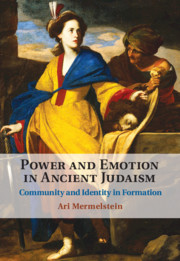Book contents
- Power and Emotion in Ancient Judaism
- Power and Emotion in Ancient Judaism
- Copyright page
- Dedication
- Contents
- Acknowledgments
- Abbreviations
- Introduction Power and Emotion in Ancient Judaism
- Part I Jewish Emotional Resistance to Gentile Power-Over in the Greco-Roman Diaspora
- 1 Emotional Resistance to Physical Power-Over
- 2 Emotional Resistance to Domination
- 3 Resistance to Emotional Stereotypes
- Part II Jewish Emotion Discourse in Response to Divine Power-Over
- Part III The Dead Sea Sect As Emotional Community
- Conclusion
- Bibliography
- Primary Source Index
- Modern Author Index
- Subject Index
3 - Resistance to Emotional Stereotypes
Emotional Stereotypes and Power Dynamics in 3 Maccabees
from Part I - Jewish Emotional Resistance to Gentile Power-Over in the Greco-Roman Diaspora
Published online by Cambridge University Press: 04 June 2021
- Power and Emotion in Ancient Judaism
- Power and Emotion in Ancient Judaism
- Copyright page
- Dedication
- Contents
- Acknowledgments
- Abbreviations
- Introduction Power and Emotion in Ancient Judaism
- Part I Jewish Emotional Resistance to Gentile Power-Over in the Greco-Roman Diaspora
- 1 Emotional Resistance to Physical Power-Over
- 2 Emotional Resistance to Domination
- 3 Resistance to Emotional Stereotypes
- Part II Jewish Emotion Discourse in Response to Divine Power-Over
- Part III The Dead Sea Sect As Emotional Community
- Conclusion
- Bibliography
- Primary Source Index
- Modern Author Index
- Subject Index
Summary
Constructing hegemonic feeling rules, as we saw in Chapters 1 and 2, is one strategy through which emotions can support power-over. But it is not the only way to do so. Assigning emotional stereotypes to a group is another way of establishing the power dynamics that define social interaction. The negative emotional stereotypes associated with the modern Jew, including self-hatred, envy, guilt, paranoia, hysteria, and excessive maternal love, all reflect Jews’ marginalization, dispossession, and sense of insecurity. One pervasive stereotype that plagued Jews throughout the Greco-Roman world across many centuries was their hatred of outsiders. The kosher food laws, table fellowship practices, and preference for endogamy were all interpreted as reflections of Jewish antipathy toward non-Jews. In the best case scenario, these accusations would have complicated efforts by Jews who sought to integrate into their surrounding culture; Jews who chose to maintain simultaneously their allegiance to their ancestral traditions and active role in Greco-Roman life had to respond to such accusations – both outwardly to non-Jews as well as internally in crafting their community’s emotion discourse. On the other hand, these allegations could also serve as the basis for challenging Jews’ fitness as citizens in the Diaspora, as was the case at various points during the first century ce. In this chapter, I turn to the book of 3 Maccabees, a work that, I argue, resists this emotional stereotype and presents Jewish feelings toward non-Jews in a more favorable light. The fact that the author of 3 Maccabees could associate these accusations with official persecutions means that, in the minds of some Jews, these allegations could have far-reaching consequences.
- Type
- Chapter
- Information
- Power and Emotion in Ancient JudaismCommunity and Identity in Formation, pp. 99 - 112Publisher: Cambridge University PressPrint publication year: 2021



